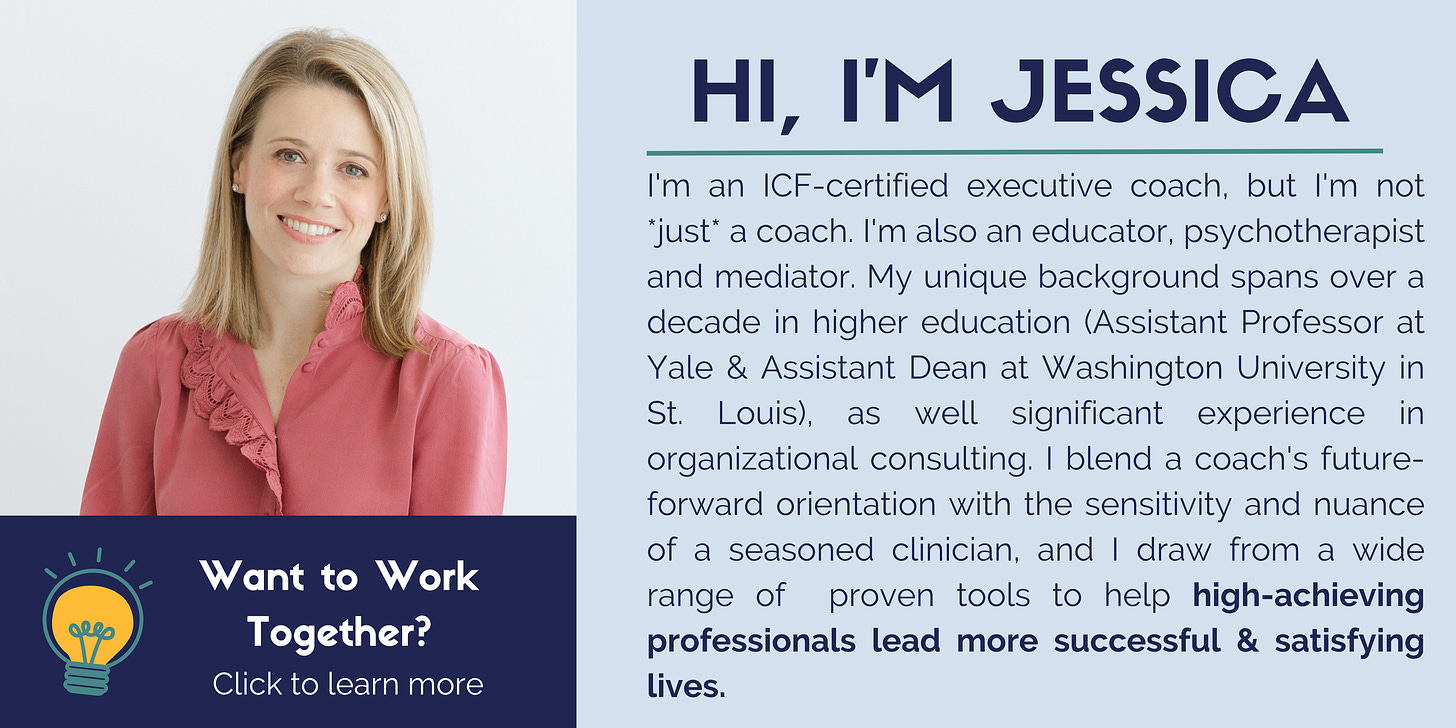Words of wisdom for working moms (2024 edition)
In this newsletter, I talk a lot about dualities—stillness and movement, ambition and ambivalence, reactivity and proactivity. In my tagline, I say that I write for working moms (and enlightened dads and grandparents) who value professional success and being an involved parent. And so, this week, I encourage you to acknowledge the dualities inherent to this time of year. I hope you embrace both time with family and community, while also carving out time for solitude and reflection.
In that vein, I wanted to share words of wisdom from some of the amazing women that I’ve interviewed in the newsletter this past year. In addition to the individual interviews excerpted below, I would also direct you to my series on ex-pat moms (maybe my favorite thing I wrote this year). There are so many fascinating stories about pregnancy, parental leave, childcare, and raising kids abroad.
So, without further adieu, I’m rounding up my favorite pearls of wisdom specifically on working parenthood from 2024. I hope you enjoy!
Dawn Huckelbridge, Founding Director of Paid Leave for All, on her best advice for working moms…
“There’s no one way to make it work, and the struggle is not your personal failing. Ask for help from partners, friends, family. Build your tribe. Take care of yourself. Know your rights. Fight for federal paid leave. But most of all, I like to say, becoming a mother is transformational in a lot of ways, but you can still be whoever you want to be. Just like fatherhood or parenthood, don’t believe in tropes, it’s no one thing. The best thing you can be for your child is fulfilled — and yourself [emphasis added].”
Chelsey Goodan, author of "Underestimated: The Wisdom and Power of Teenage Girls", on learning to manage worry…
“Worry is based in fear [. . .] By worrying, we think that can help create a desired outcome, but in reality, that’s perceived control. At the end of the day, we can’t control other people’s thoughts and actions. One way that I help manage this (very human and normal) inclination to worry is to first: Become aware of it. I’ve gotten better and better at catching myself spiraling into a state of worrying. And with that awareness, I stop, and ask myself: Is this in my control? Or is this me trying to control someone else’s behavior? If it’s about someone else, then I have to do whatever I can to let it go and trust. That worry will just burn up my energy otherwise. I’ve found that when I make a choice inside of my brain—to choose trust—then it grows from there. Trust generates more trust, and the people around me really appreciate when they feel trusted.”
Nora Fiffer, director of "Another Happy Day", on how motherhood changed her…
“I mean, I'm more tired, but I'm more industrious! And because the hours were really precious and there was virtually no independence for a long time, what I did with my time took on such import. I remember when my daughter was five weeks old, going to an audition and feeling so proud of myself for preparing and getting out there. And it had gone fine, but the hunger—that really is so essential for being an actor, just to keep going —had diminished. I no longer wanted to be in a position where I'm being hired and have no control. I really lost my appetite for that particular grind.
It became clear, after becoming a mother, that the stories that I want to tell really have to matter to me. I wanted to be the agent of my own stories, and I hadn't focused on writing before. And that just completely shifted. And since then, writing, directing and producing have been my focus.”"
Lauren Smith Brody, founder of the Fifth Trimester, on giving yourself grace when work gets demanding…
“I think it's important for your readers to acknowledge and not feel bad about the fact that, inevitably, there will be work sprints—there will be things that require creative compromise. I find that the antidote to resentment is ‘paying yourself back’, even if it doesn't work out to be the exact same number of hours that you give yourself back, but it’s important to do something that just feels like a little win for yourself.”
Beth Fisher-Yoshida, author of "New Story, New Power: A Woman's Guide to Negotiation" on teaching kids negotiation skills…
“Kids are often demanding things they want. Parents can build negotiation skills by hearing them, acknowledging them and then saying, "Well, let's see if we can do it this way, instead. Let's see what our other options are." And really exploring options gives them that understanding that it doesn't have to be only their demand. Because they know that you've heard them, you're paying attention to them, you're emotionally involved with them. But also that it’s important to consider other options that are mutually agreeable—or even better.”
Gloria Rivera, host of “No One’s Coming to Save Us Podcast” on whether COVID was a turning point in the national conversation on childcare…
“I think it was. I am a glass half full person and I'm a glass half full reporter. And so I would say that yes it was a turning point because now we're all talking about it. How many conversations did you have about childcare before COVID? Not too many. So I choose to say yes.
Now the next question is, okay, so what's been done about it? And that's the harder question to answer because with COVID relief, we did see federal dollars invested in helping families. And we spoke to parents who just would say the most beautiful things about how they used those funds. Single mothers would use those funds to hire a babysitter so that they could go participate in the PTA, or they could go do something for, God forbid, their wellbeing. It was looking good, but then all that funding went away. It's hard not to be down about it, but I think that COVID was a turning point because it got the entire country to wake up and finally see mothers.”
Dr. Shelby Harris, author of "The Women's Guide to Overcoming Insomnia", on her best tips for getting a better night’s sleep…
“Inconsistent sleep-wake schedules are a big issue. Try not to have more than a swing of an hour to 90 minutes max in the mornings, being as consistent to the same bed/wake times is really helpful. Finding time to wind down before bed is useful, as sleep isn’t an on/off switch. Also, limiting caffeine within 8 hours of bed is helpful. Light exposure during the day is important to help set your body’s circadian rhythm and sleep-wake pattern, as well as dimming the lights and darkness/cool room at night.”
Liana Slater co-founder of Monumental Me, on the importance of asking for help…
“The best thing we can do to set ourselves AND our kids up for success is to model asking and expecting help and participation in all aspects of home life. Once we let go of the feeling we need to do it all, we are much closer to reducing a sense of overwhelm and eliminating guilt.”
Molly Dickens, from the Maternal Stress Project on potential solutions to parental stress…
“I think of solutions in concentric circles. You have the individual at the center—and though there are a lot of good stress management techniques that exist on the individual-level, I think we over-rely on them when we talk about solutions. As you said, a massage is not going to cut it!
In the next circle out, there are partner-based solutions – for example, redistribution of the mental load. Outside of that you have friends and family, and beyond that is the larger community and workplace – solutions here revolve around shifting the narrative, shifting how we interact with each other, and shifting how we show up for each other in our communities and at work. The Surgeon General’s advisory also had some good ideas for community, especially as it relates to loneliness.
And then, of course, we have the outer circle, the larger policy level, which, when done well, can positively impact the largest range of individuals —things like access to affordable (or free!) childcare, paid leave, and an expanded social safety net.”





